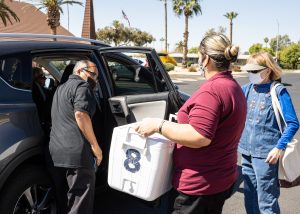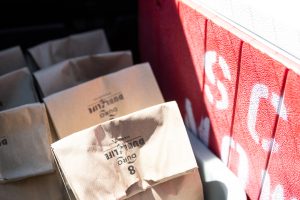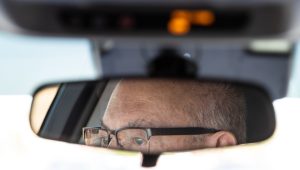- Slug: BC-CNS Meals on Wheels Pets, 880 words
- 5 photos and captions below.
By Eryka Forquer
Cronkite News
SUN CITY – Steve Siegel, a volunteer with Sun City Meals on Wheels, walks back to his vehicle after delivering prepared food to an older homeowner who lives alone.
“We’re the only contact that they have once a day,” Siegel said. “It assures them that they’re at least checked on daily, depending on how often they get their meals.”
That daily contact gives volunteers critical insight into whether lonely clients are suffering health consequences. Meals on Wheels America and Arizona State University now are partnering on a study of the effect pets have on social isolation and loneliness, and how the meal service can expand its programs for pet owners.
As more baby boomers pass retirement age, the problem will only grow. Nearly one-fourth of adults 65 or older are considered socially isolated, which can lead to loneliness and health risks, including higher rates of anxiety, depression and suicide, according to the National Academies of Sciences, Engineering and Medicine.
Isolation robs people of important human interactions, said Aaron Guest, an assistant professor of aging with ASU’s Center for Innovation in Healthy and Resilient Aging.
“When we’re disconnected or isolated and don’t have people around us.” he said, “we kind of don’t have the benefits of things like touch, the ability to see someone else or the ability to debrief after an event.”
Guest said pets help their owners feel less alone.
Meals on Wheels America is a national association dedicated to addressing hunger and isolation among seniors. It supports Meals on Wheels programs across the country that provide services tailored to the needs and resources of their communities. Programs generally serve meals to adults 60 or older, and the cost ranges from free to full price.
The organization also delivers pet food; cat litter; leashes and other supplies, including toys and treats, through its Meals on Wheels Loves Pets grant program. And it helps clients obtain temporary pet boarding, preventative veterinary care and grooming services.
The study ASU is conducting builds upon previous research that Meals on Wheels America conducted with 415 clients with pets, which highlighted the extent of the human-animal bond.
“For the first round of research we did, we found that about 70% of those surveyed lived alone, and this group reported almost 100% that their pets bring happiness to their life,” said Morgan Hultquist, manager of the Meals on Wheels America Strategy and Impact team.
The majority of respondents agreed that having a pet makes them healthier and feel less lonely. Hultquist said the previous study also revealed a need for pet assistance.
“Meals on Wheels clients cited needing pet food, vaccinations and nail trims the most,” she said, adding that about 30% of those interviewed mentioned they sometimes ignore their personal needs to care for their pets.
About half of the 415 clients also reported they had no one outside Meals on Wheels to help them with their pets. Hultquist said many of the Meals on Wheels community programs began offering pet services after seeing clients feed their pets portions of their home-delivered meals. The organization has distributed pet food donations to more than 350 local programs across the nation.
Meals on Wheels America’s partnership with ASU will help expand its services for clients with pets.
“I just think that those results are going to really complement our first round of research and give us additional insight into not only confirming things that we already knew, but also to add to continuing to work,” Hultquist said. “To expand programming and make sure that we’re creating proper resources and technical assistance just through what we learned and to better support Meals on Wheels programs and their clients as well.”
Researchers will survey 400 Meals on Wheels clients with and without pets. Questions for pet owners include whether the owner receives support from any professional service for their pet, has someone to drive their pet to the vet, and whether they have ever gone without personal care or necessities to provide for their pet.
The survey also includes prompts that target the bond between animals and their owners. Respondents are asked whether they consider their pet a family member and whether their pet provides comfort or emotional support.
The study results are expected by late spring or early summer, Hultquist said.
Guest said the results will provide more insight into the human-animal bond and allow him and fellow researchers to provide a set of recommendations for national implementation.
“I think we will see that pet ownership is protective in some ways, meaning that owning a pet will result in reduced rates of social isolation and reduced rates of loneliness,” he said. “I expect we’ll see that people are pretty strongly bonded with their pets, but I also expect we’ll see challenges in pet ownership that we haven’t even considered yet.”
Guest said survey respondents have reported challenges to getting appropriate veterinary care.
“As we think about designing the program and our recommendations, we’re going to have to consider the diversity of environments,” he said. “Obviously, it’s maybe easier to design something for someone who lives in a place like Phoenix than it is for someone who lives in a more rural environment.”
For more vital news about health and health disparities, sign up for our Pathways to Equity newsletter.
^__=




